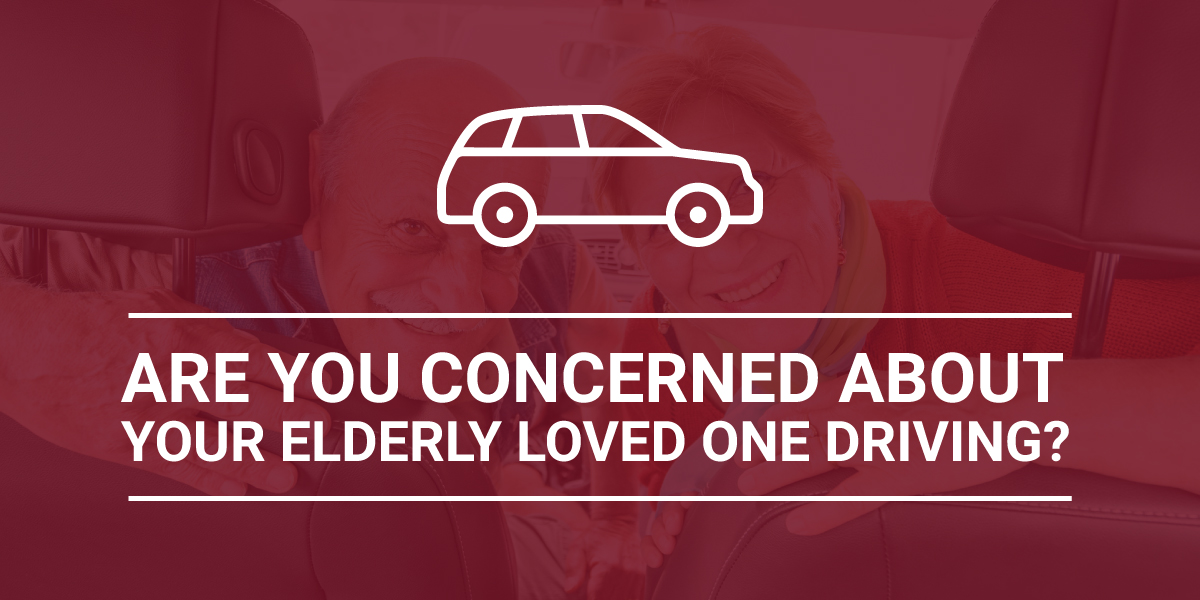As your parents and relatives get older, you may worry about them driving. Elderly drivers are often experienced and cautious drivers. But they face a lot of issues that can make it hard for them to remain safe behind the wheel.
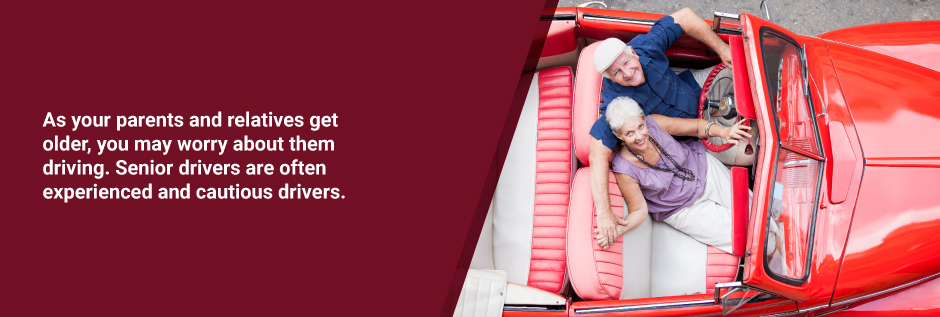
Elderly drivers may deal with muscle weakness in their legs and feet, confusion and getting lost, declining eyesight, and being intimidated by high speeds and heavy traffic. All of these issues and others could result in your loved one being in a serious or fatal crash.
To ensure your elderly drivers limit their driving appropriately or stop driving at the right time, you need to be proactive about talking with them about their abilities and recent driving experiences. By having these difficult conversations, you can save your loved one from a great deal of pain in the future.
Signs Your Loved One May Not Be Able to Safely Drive
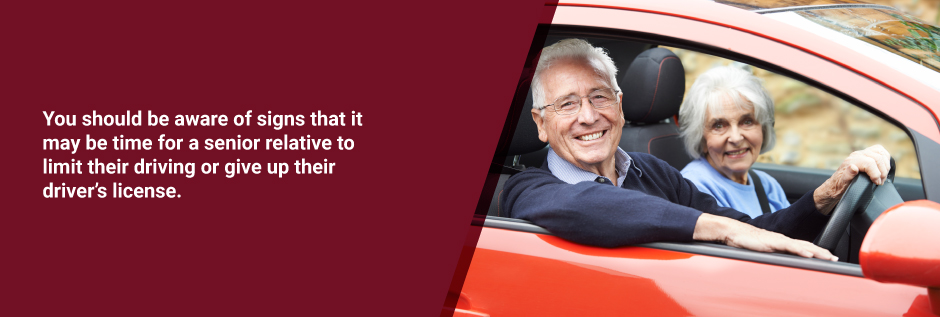
You should be aware of signs that it may be time for a senior relative to limit their driving or give up their driver’s license.
Common signs that someone can no longer safely drive include:
- Missing or ignoring traffic devices
- Driving too slowly
- Becoming confused, disoriented, or lost in familiar places
- Having trouble reacting to sudden changes
- Braking or stopping abruptly without need
- Accelerating suddenly without need
- Drifting into or straddling lanes
- Making sudden lane changes
- Failing to use turn signals or leaving signals on after a turn or lane change
- Forgetting to check for oncoming traffic when turning or making a lane change
- Backing up after missing a turn or exit
- Having trouble parking
- “Two-footed driving”- simultaneously pushing on the brake and the accelerator
- Dents and scrapes on the vehicle from hitting mailboxes, fences, and garage doors
- Being issued two or more warnings or tickets in the previous two years
Colorado Laws for Elderly Drivers
Colorado has several driving laws that may apply to the seniors in your life.
License Renewals
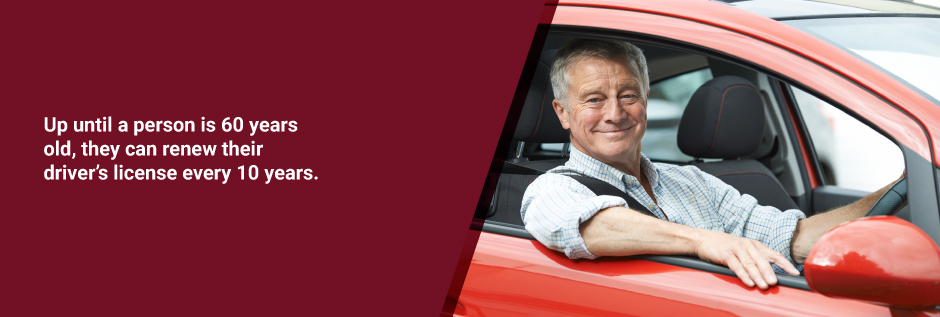
Up until a person is 60 years old, they can renew their driver’s license every 10 years. Then, the state requires that everyone who is 61 years or older renew their driver’s license every 5 years. Until someone is 66 years old, they can renew their driver’s license online or by the mail.
Once an individual reaches the age of 66, they must renew in person and take and pass a vision test. Anyone older than 66 years can only renew their license by mail if they have passed a vision test within the previous 6 months.
Re-Examinations
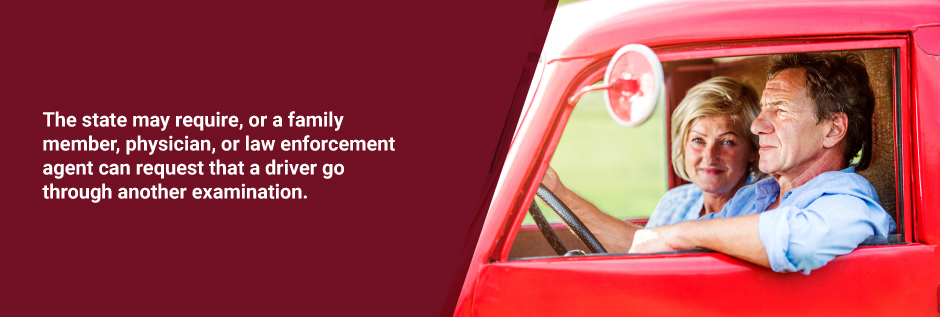
The state may require (or a family member, physician, or law enforcement agent can request) that a driver go through another examination. The state may do so if a driver has two accidents on their record within 3 years or if a driver is involved in a fatal crash. A physician, family member, or law enforcement officer can also request that the state require a re-examination based on medical concerns.
If the state requires a driver to take a re-examination, the driver is notified by mail. The driver then has 20 days from the date of the letter to take a re-exam at the nearest full-service office. A re-examination encompasses vision, writing, and driving tests.
It is important to note that physicians are not required by Colorado law to notify the state when a senior’s eyesight is too poor to drive. You cannot rely on your loved one’s doctor to notify the DMV when their eyesight has gotten too bad or to do anything when they know.
License Restrictions
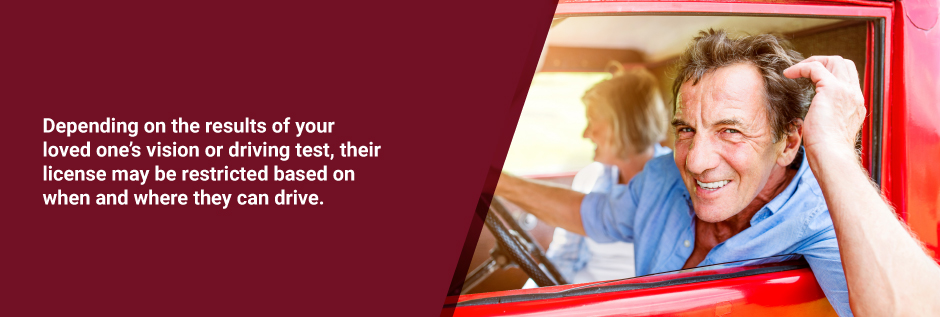
Depending on the results of your loved one’s vision or driving test, their license may be restricted based on when and where they can drive. For example, your loved one may not be allowed to drive at sunrise or sunset, or when it is nighttime.
Speak with Your Older Family Members

It is all too clear that families are not talking with their older loved ones about driving. According to a study by the AAA Foundation for Traffic Safety, nearly 83 percent of elderly drivers reported they never spoke to a family member or physician about their safe driving abilities. Of the seniors who did talk with their families about driving, 15 percent did so after a traffic offense or accident.
You do not want to have to address your loved one’s driving after they are involved in or the cause of a crash. Instead, it is important to start these conversations early. It can be tough to bring up.
Most elderly drivers are very reluctant to admit their driving abilities are diminishing. However, there are ways to address the situation while still being proactive and kind.
Colorado offers a Guide for Aging Drivers and Their Families. In this guide, there is a self-examination that you can go through with your loved one to determine if they are showing signs of unsafe driving. It also provides tips on how you can be more involved and help your senior loved ones prepare for when it is time to stop driving.

Contact a Lawyer Today
If your elderly loved one has been in an auto accident or if you or a loved one were injured by an elderly driver, speak with an attorney about your options. A Denver personal injury lawyer at the Donaldson Law, LLC can help, so contact us today to schedule your initial consultation.

